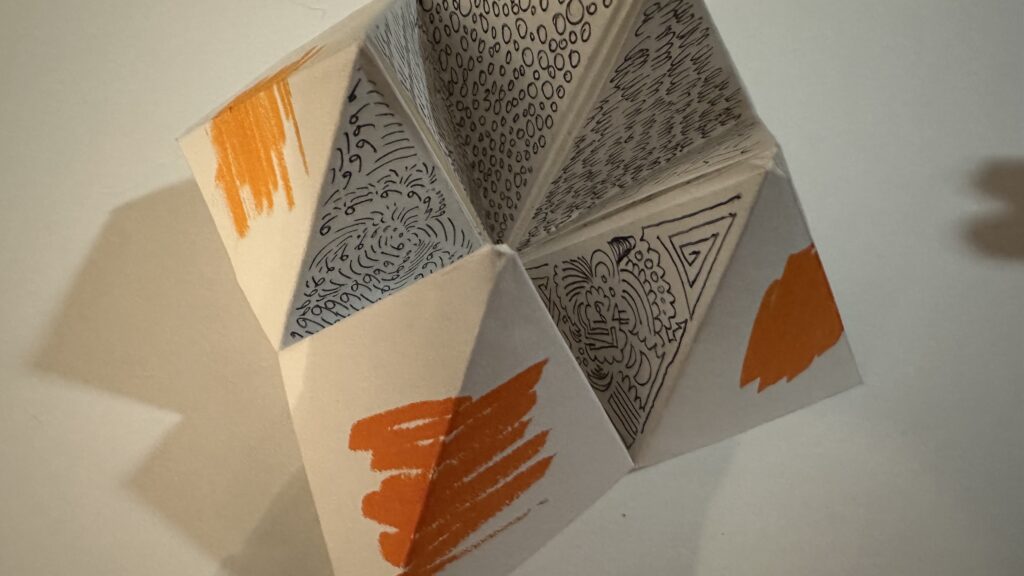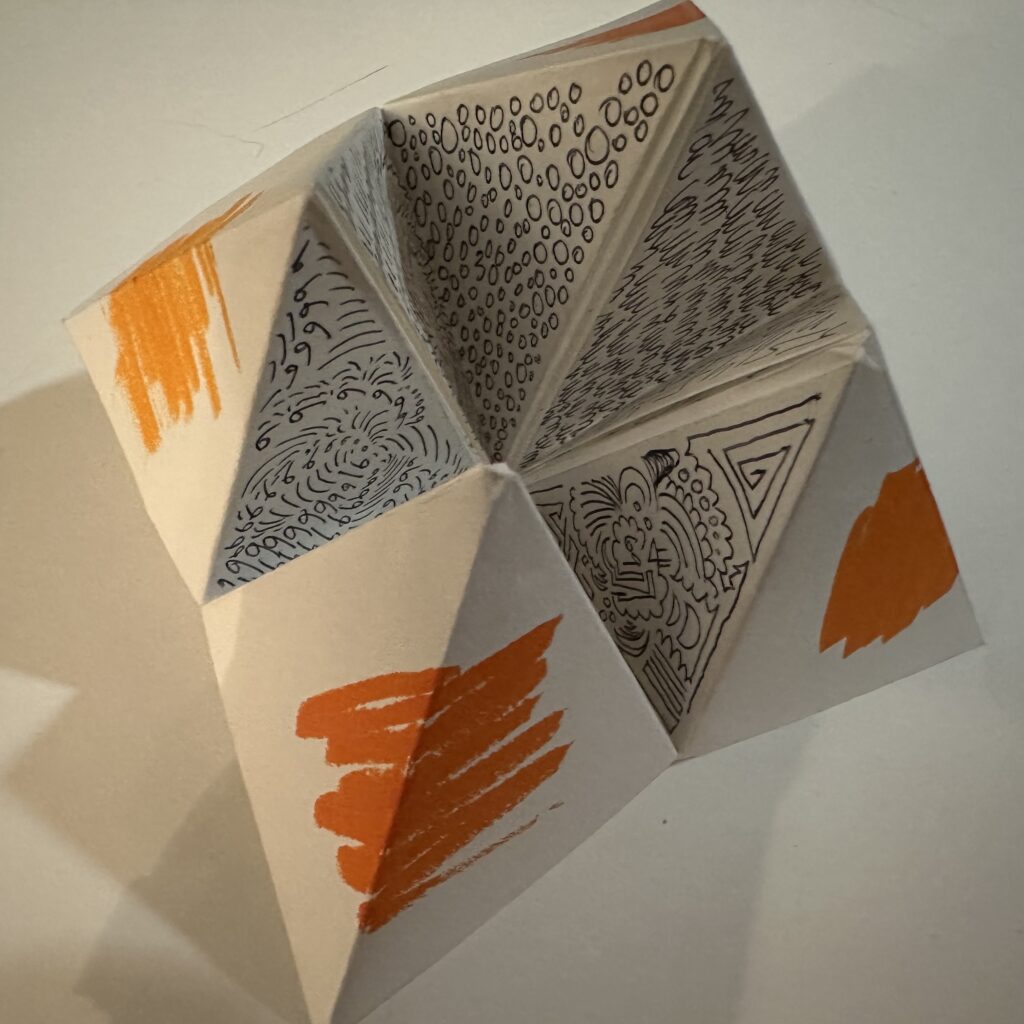6 minute read. Content warning: Brief mention of drug use (in the context of a family member’s experience), mild mention of dissociative experiences (voices/entities) and discussion of past experiences with negative social interactions (humiliation, awkwardness)
chatGPT Summary: Kay reflects on the intersections between childhood games, pop psychology, and personal history, and creates a personal fortune teller as a meditative response to the complexities of identity and self-understanding.
Vancouver, a colonial city on the stolen land of many Indigenous territories, lands, and waters – I kept thinking about the frustrations I had with pop psychology and divinatory practices. Growing up, there were a few games that I later discovered were related to cultural divination practices like the I Ching or the throwing of runestones, but as a child, these games were simply games of chance. As innocent as rolling the dice and feeling the thrill when the number you wanted came up, the disappointment when someone else in your group got their number, or the shared frustration when the dice didn’t favour anyone. As a teenager, I remember those same games either being considered juvenile as we all raced to out-mature each other, or they became tools as we awkwardly puzzled out the hormones and attraction we were all pressured into, pressuring others into, supposed to, and might have actually felt. The cootie catcher, or paper fortuneteller, had been a game that I loved making because paper-folding was something I was quite adept at doing. It made for a quick, excellent holder of beads or a simple hand puppet, and so it was a versatile skill I had in my socializing toolkit. If I was seated at a table with paper and struggling to follow along with what others were saying, I could busy my hands with something that would either get me attention or make me a useful and popular addition to the group. Even if the fortuneteller wasn’t played to the deepest layer, it could be used as a random number generator or simply as an icebreaker to non-verbally ask someone their favourite colour.
Less connected to actual fortunes, I used to write nice things inside before I understood the power and importance of affirmations. I don’t remember exactly how I felt when I would get a bad fortune or a mean message, but I have echoes of memories of it happening and of an assembled group laughing at my misfortune, or that of the active player, for having received a nasty surprise. I still struggle with the idea of humiliation as humour, but I have also developed an aversion to affirmations and compliments as an adult. I’m sure they’re all related, but I’m not a doctor or behavioural scientist, so I’ll leave off making any diagnosis.
As the month rushes to a close, and I continue to chip away at The Unseen, with only four completed works of the eventual 31, I wanted to create one additional piece to mark the August prompt. I don’t discount my writing as nothing, and each blog post is part of the work related to the summer Nexus Project. In fact, one of the things I am most grateful for with this project is the external push and prompt to write, something I had aspired to during my last October residency but ultimately dropped eight days into the project, while continuing to work in the background. Accountability is important.
Yet, even as I engage in chat conversations with KM, who is struggling with not completing any physical artwork, and I adamantly remind them that completion isn’t important, and that the act of thinking and being in conversation and community is an acceptable way of participating, I understand their struggle. It’s tempting to count only the number of physical pieces I’ve completed and discount the conversations we’ve had over text or the articles I’ve written, even if they’ve been done in frustration.
The idea to create a fortuneteller for myself came after a conversation with a family member who has been struggling. We’ve been sharing and talking about ways we exist, the realities we create, and move through, and how they’re not always congruent with those experienced by the people around us. Without going into too much detail, my family member reflected on a time when they had experienced multiple versions of themselves at once. They recognized it as a symptom of drugs, but noted that it wasn’t something they wanted to experience again. In comparison, this is a state I often deal with, and I appreciate that the voices and entities I must contend with are almost always me. And I know me, no matter which me is at the wheel. I am aware of my actions, even though my memory may not be the greatest. As I age, I am more often confronted with a memory that feels sharp and true but cannot be corroborated by those who were there; however, the seed and shape of our shared memories are still equivalent.
There are many reasons why I like to be alone, and without dwelling or listing them here, I know one reason is that I am not alone. If I need to be distracted, it’s from myself. If I am bored, it’s due to an action that I am bored with, not for lack of thinking, talking, trying, or doing something else. So, what should a paper fortuneteller say when the person writing the fortuneteller is the one to use it? I’ve previously engaged in letter-writing to myself, both as a cognitive behavioural therapy and as a low-cost time capsule. I’ve also written lists of affirmations or things that I enjoy, in anticipation of future times when I, who am writing this now, or the future me, who will struggle, cannot summon ways to find relief, joy, rest, or fulfilment. Having explored and continuing to practice those methods, I wanted this last leave-behind to be something different. And so, I decided, rather than trying to fix or invest for the sake of future emotions and states of being, to respond to KM’s prompt with a fortuneteller for any time that would be true to all of me.


Technology note:
I continue to test the use of AI within my writing and artistic practice. I used chatGPT to create a summary and reading estimate, and recommend some content warnings for this blog, and Grammarly to assist me in spelling and grammar.
